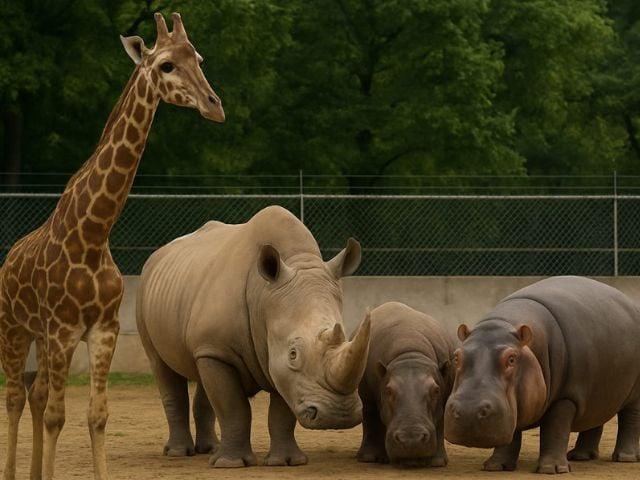The Punjab Wildlife Department faces another obstacle in its animal import plans, since the Department of Animal Quarentena has retained authorization for the importation of giraffes, rhinoceros and hippos of South Africa.
The ambitious initiative to bring great exotic animals for the Lahore and Safari Park zoo has now been delayed indefinitely, after a similar suspension of the elephant import project.
Punjab’s wildlife officials are still hopeful, however, that the situation will be resolved soon, which allows the arrival of animals as part of the continuous renewal of Lahore’s zoological facilities.
Several birds and animals have already been acquired both nationally and internationally for Lahore and Safari Park.
However, the importation of main species, including 12 giraffes (nine for safari and three for the zoo), three rhinos (one for the zoo and a pair for the safari) and a male hippo for the zoo, has been delayed.
According to Mudassar Hassan, director of the Renewal Project, while the Federal Ministry of Climate Change has issued a non -objection certificate (NOC) for the importation of several species, including Giraffes, Rhinos, Hippos, Antelopes de Nyala and Zebras, excluded from the elephants, the Department of Animal Quarantina has not yet granted the final approval by concern about concerns about the risk of disease.
Officials of the Animal Quarentina Department told Express News that health certificates for animals that are imported from South Africa are currently under review to guarantee compliance with Pakistan import regulations.
“If the existing health certificates do not meet the required standards, we will seek an additional verification of the importers,” said an official. “This is a purely procedural issue, aimed at ensuring that no foreign disease enters the country.”
The department is particularly cautious about the presence of foot virus and oral disease (FMD) in several African countries, including South Africa. While this strain is not currently present in Pakistan, officials fear that their introduction can represent a serious threat to the local cattle industry.
The sources confirm that a temporary prohibition has been established in the importation of giraffes, rhinos, hippos and other large animals in South Africa as a precautionary measure due to the risk of FMD.
The quarantine department has advised the Wildlife of Punjab to explore alternative countries for the acquisition of animals, preferably those free of the FMD virus.
However, Mudassar Hassan pointed out that this suggestion is difficult to implement. “These species are not available in other countries or are not surpluses,” he said. “In addition, only South Africa has the infrastructure of load aircraft necessary to transport such large animals.”
He added that the Wildlife Department has proposed a quarantine plan under which animals will undergo initial quarantine in South Africa, followed by another quarantine period from 15 to 30 days when arriving in Pakistan.
“In addition, the specific strain of the FMD virus that is cited has never been informed in rhinos or hippos,” he said. “It is also important to keep in mind that these animals will be housed in zoos and safari parks, not very close to cattle.”
Although the positions of the Wildlife of Punjab and the animal quarantine department differ, the WWF Pakistan representative, Dr. Uzma Khan highlighted another important issue: the source of animals. “We should import zoos animals, not directly from nature,” he said. “It is difficult to confirm if imported animals are captured in nature or raised in captivity, especially in African countries.”
Dr. Khan emphasized the importance of following legal and ethical protocols. “It is preferable to obtain zoos, safari parks or certified breeding farms in FMD free countries, since these animals adapt better to captivity,” he said. “In contrast, animals captured in nature often suffer stress and disease when they are limited.”
Another critical concern is the fiscal timeline. If the animals are not imported within the current financial year, the funds assigned for the project will expire under public finance regulations.
However, the project director, Mudassar Hassan, is still optimistic that imports will proceed on time. “Discussions are being made to extend the import deadline,” he said. “I can’t say anything definitive yet, but we hope to deliver good news to the public very soon.”
Launched in 2023 under the caregiver’s government, the renewal project of the Lahore and Safari Park zoo was assigned almost RS. 5 billion.
The success of animal imports is considered a crucial milestone in project progress.




